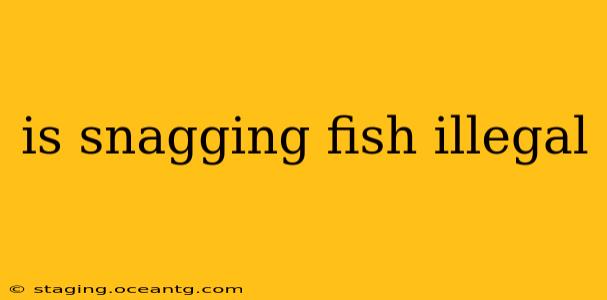Is Snagging Fish Illegal? A Comprehensive Guide to Legal Fishing Practices
Snagging fish, a controversial fishing technique, involves hooking a fish in any part of its body other than the mouth. The legality of this practice varies significantly depending on location and specific regulations. While some jurisdictions outright prohibit it, others may allow it under certain circumstances or with specific limitations. This guide will clarify the legal nuances surrounding snagging fish and help anglers understand responsible fishing practices.
What Constitutes Snagging?
Snagging is generally defined as intentionally hooking a fish anywhere other than its mouth. This typically involves using lures or weighted hooks that are dragged through the water, aiming to snag a fish on the body, fins, or tail. The intent is crucial; accidentally hooking a fish outside the mouth is different from deliberately targeting it this way. However, even accidental snagging can lead to penalties if local regulations are strict.
Why is Snagging Illegal in Many Places?
The illegality of snagging stems from its significant negative impacts on fish populations and the overall health of aquatic ecosystems. Here's why:
- High Mortality Rates: Fish snagged outside the mouth often suffer severe injuries, leading to a high mortality rate even if they are released. The hooks can tear flesh, damage internal organs, and cause debilitating wounds.
- Damage to Fish Populations: The indiscriminate nature of snagging can disproportionately affect vulnerable fish species and disrupt the balance of the ecosystem. It often targets larger, mature fish, impacting their reproductive potential.
- Unsporting Conduct: Many consider snagging unsportsmanlike and unethical, as it prioritizes catching fish over respecting the resource and ensuring its sustainability. It diminishes the thrill of angling by removing the skill and challenge involved in proper hooking.
Where is Snagging Legal? (If Anywhere)
The legality of snagging is highly variable and dependent on specific local, state, or provincial regulations. There is no universal answer. Some jurisdictions may allow snagging of certain species under strict conditions, such as during specific seasons or in designated areas where populations are overabundant and require control. It's crucial to thoroughly research and understand the regulations governing your specific fishing location before engaging in any angling activity.
What are the Penalties for Snagging?
Penalties for snagging can vary greatly, ranging from fines to license revocation or even criminal charges in more severe cases. The specific penalties are determined by the governing agency and the severity of the infraction.
What are the Alternatives to Snagging?
Responsible anglers employ various ethical and effective fishing techniques that ensure a higher survival rate for fish and promote sustainable fishing practices. These include:
- Using Appropriate Lures and Baits: Selecting lures and baits designed to target the mouths of fish.
- Employing Proper Hook Setting: Setting the hook firmly when a fish bites, minimizing the chance of a gut-hook.
- Practicing Catch and Release: Handling fish carefully and releasing them quickly to maximize survival rates.
- Respecting Size and Bag Limits: Adhering to established regulations on fish size and catch limits to protect fish populations.
How Can I Find Out the Local Regulations on Snagging?
Before you go fishing, it's imperative to check the specific regulations for your area. Contact your local fish and wildlife agency, consult online resources from the relevant governing bodies (e.g., state Department of Natural Resources or provincial equivalent), or visit local tackle shops for information.
In conclusion, while some areas may have limited exceptions, snagging is generally considered illegal due to its detrimental effects on fish populations and the environment. Always prioritize responsible and ethical fishing practices to ensure the long-term sustainability of aquatic resources. Remember, checking local regulations is not optional; it's mandatory for every angler.
